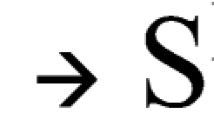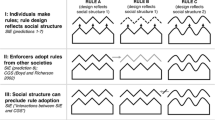Abstract
In the context of applying behavior-analytic principles to the study of the evolution of human societies, we propose that rules constitute the basic units of sociocultural selection. Such thesis is based on a critical analysis of the ideas concerning sociocultural selection proposed by Skinner and Baum. Its point of departure is a new functional concept of rule uttering, defined as a special type of verbal behavioral pattern, whose probability of occurrence depends upon their probability of altering the frequency of certain kind of behavior in the repertoire of a given individual or group of individuals. These relatively lasting changes in the behavior of recipients include the uttering of rules appropriate to specific types of problem situations, which increase the likelihood of responses that solve the problems faced by the social group. According to the proposed model, rule-uttering behavioral patterns include rule application, rule transmission and rule creation, which are functionally distinguished by the social consequences they produce. Patterns of rule uttering are selected by operant mechanisms, in the sense that those that do not increase the probability of solving problems tend to stop occurring. It is proposed that the occurrence probability of generalized social reinforcers, associated to different functionally specialized social systems (e.g., money in the economy, sanctions in the legal system), constitutes the main consequence responsible for rule-uttering selection.
Similar content being viewed by others
Notes
As explained by Skinner (1969), “scientific laws also specify or imply responses and their consequences. They are not, of course, obeyed by nature but by men who deal effectively with nature” (p. 141).
References
Acemoglu, D., & Robinson, J. A. (2012). Why nations fail: The origins of power, prosperity, and poverty. New York, NY: Crown Business.
Alexander, R. D. (1987). The biology of moral systems. New York, NY: de Gruyter.
Baum, W. M. (1995). Rules, culture, and fitness. The Behavior Analyst, 18(1), 1–21. https://doi.org/10.1007/bf03392688.
Baum, W. M. (2000). Being concrete about culture and cultural evolution. In N. Thompson & F. Tonneau (Eds.), Perspectives in ethology: Evolution, culture, and behavior. New York, NY: Kluwer Academic/Plenum.
Baum, W. M. (2005). Understanding behaviorism: Behavior, culture and evolution (2nd ed.). Oxford, UK: Blackwell.
Betzig, L. L. (1986). Despotism and differential reproduction: A Darwinian view of history. London: Aldine.
Blakely, E., & Schlinger, H. (1987). Rules: Function-altering contingency-specifying stimuli. The Behavior Analyst, 10(2), 183–187. https://doi.org/10.1007/bf03392428.
Boudon, R. (1977). Effects pervers et ordre social. Paris, France: Presses Universitaires de France.
Campbell, D. T. (1974). Evolutionary epistemology. In P. A. Schilpp (Ed.), The philosophy of Karl R. Popper (pp. 413–463). La Salle, IL: Open Court.
Catania, A. C. (1998). Learning (4th ed.). Upper Saddle River, NJ: Prentice Hall.
Corning, P. A. (2014). Evolution “on purpose”: How behavior has shaped the evolutionary process. Biological Journal of Linnean Society, 114, 242–260. https://doi.org/10.1111/bij.12061.
Corsi, G., Esposito, E., & Baraldi, C. (1996). Glosario sobre la teoría Social de Niklas Luhmann. (M. R. Pérez & C. Villalobos, under the coordination of J. T. Nafarrate, trans.). Mexico City, Mexico: Universidad Iberoamericana Universidad Iberoamericana, Instituto Tecnológico y de Estudios Superiores de Occidente (ITESO), and Editorial Anthropos.
de Aguiar, J. C. (2017). Teoria analítico-comportamental do Direito. Porto Alegre, Brazil: Núria Fabris.
Eggan, F. (1963). Cultural drift and social chance. Current Anthropology, 4(4), 347–355. https://doi.org/10.1086/200393.
Friedman, D. D. (1986). Price theory: An intermediate text. Cincinnati, OH: Southwestern.
Glenn, S. S. (1988). Contingencies and metacontingencies: Toward a synthesis of behavior analysis and cultural materialism. The Behavior Analyst, 27, 133–151. https://doi.org/10.1007/bf03392470.
Glenn, S. S. (2003). Operant contingencies and the origin of cultures. In K. A. Lattal & P. N. Chase (Eds.), Behavior theory and philosophy (pp. 223–242). New York, NY: Kluwer Academic/Plenum.
Glenn, S. S. (2004). Individual behavior, culture, and social change. The Behavior Analyst, 27, 133–151. https://doi.org/10.1007/bf03393175.
Gosselin, A. (1998). La logique des effects pervers. Paris, France: Presses Universitaires de France.
Hardin, G. (1968). The tragedy of the commons. Science, 162(3859), 1243–1248. https://doi.org/10.1126/science.162.3859.1243.
Hart, H. L. A. (1961). The concept of law. Oxford, UK: Oxford University Press.
Kelsen, H. (1967). Pure theory of law. (M. Knight, trans.). Berkeley, CA: University of California Press.
Kunkel, J. H. (1975). Behavior, social problems, and change. Englewood Cliffs, NJ: Prentice Hall.
Kunkel, J. H. (1986). The Vicos Project: A cross-cultural test of psychological propositions. The Psychological Record, 36(4), 451–466. https://doi.org/10.1007/bf03394965.
Kunkel, J. H. (1991). Apathy and irresponsibility in social systems. In P. A. Lamal (Ed.), Behavioral analysis of societies and cultural practices (pp. 219-240). (Series in Health Psychology and Behavioral Medicine). Washington, DC: Hemisphere Publishing.
Luhmann, N. (1985). A sociological theory of law. (E. King & M. Albrow, trans.). London, UK: Routledge & Kegan Paul.
Luhmann, N. (1990). Essays on self-reference. New York, NY: Columbia University Press.
Luhmann, N. (2004). Law as a social system. (K. A. Ziegart., trans.). Oxford, UK: Oxford University Press.
Malott, R. W. (1989). The achievement of evasive goals: Control by rules describing contingencies that are not direct acting. In S. C. Hayes (Ed.), Rule-governed behavior: cognition, contingencies & instructional control (pp. 269-322). Reno, NV: Context Press.
Malott, R. W. (2009). Principles of behavior (6th ed.). Upper Saddle River, NJ: Pearson Education.
Mezan, R. (1982). Freud: A trama dos conceitos. São Paulo, Brazil: Perspectiva.
Michael, J. (1982). Distinguishing between discriminative and motivating functions of stimuli. Journal of the Experimental Analysis of Behavior, 37(1), 149–155. https://doi.org/10.1901/jeab.1982.37-149.
Moeller, H.-G. (2006). Luhmann explained: From souls to systems. La Salle, IL: Open Court.
Moore, J. (2008). Conceptual foundations of radical behaviorism. In Cornwall-on-Hudson. NY: Sloan.
North, D. C., Wallis, J. J., & Weingast, B. R. (2009). Violence and social orders: A conceptual framework for interpreting recorded human history. New York, NY: Cambridge University Press.
Oliveira-Castro, J. M., Coelho, D. S., & Oliveira-Castro, G. A. (1999). Decrease of precurrent behavior as training increases: Effects of task complexity. The Psychological Record, 49(2), 299–325. https://doi.org/10.1007/bf03395322.
Oliveira-Castro, J. M., Faria, J., Dias, M., & Coelho, D. S. (2002). Effects of task complexity on learning to skip steps: An operant analysis. Behavioural Processes, 59(2), 101–120. https://doi.org/10.1016/s0376-6357(02)00087-6.
Paterson, J., & Teubner, G. (1998). Changing maps: Empirical legal autopoiesis. Social & Legal Studies, 7, 451–486. https://doi.org/10.1177/096466399800700401.
Rachlin, H. (2000). The science of self-control. Cambridge, MA: Harvard University Press.
Schelling, T. C. (1978). Micromotives and macrobehavior. New York, NY: Norton.
Schlinger, H. D. (1993). Separating discriminative and function-altering effects of verbal stimuli. The Behavior Analyst, 16(1), 9–23. https://doi.org/10.1007/bf03392605.
Simmel, G. (1902). The number of members as determining the form of the group: I. American Journal of Sociology, 8(1), 1–46. https://doi.org/10.1086/211115.
Skinner, B. F. (1953). Science and human behavior. New York, NY: Free Press.
Skinner, B. F. (1957). Verbal behavior. New York, NY: Appleton-Century-Crofts.
Skinner, B. F. (1968). The technology of teaching. New York, NY: Appleton-Century-Crofts.
Skinner, B. F. (1969). Contingencies of reinforcement: A theoretical analysis. New York, NY: Appleton-Century-Crofts.
Skinner, B. F. (1971). Beyond freedom and dignity. New York, NY: Knopf.
Skinner, B. F. (1976). About behaviorism. New York, NY: Vintage Books.
Skinner, B. F. (1981). Selection by consequences. Science, 213(4507), 501–504. https://doi.org/10.1126/science.7244649.
Skinner, B. F. (1988). Canonical papers of B. F. Skinner. In A. C. Catania & S. Harnad (Eds.), The selection of behavior: The operant behaviorism of B. F. Skinner: Comments and consequences. New York, NY: Cambridge University Press.
Skinner, B. F. (1989). The behavior of the listener. In S. C. Hayes (Ed.), Rule-governed behavior: Cognition, contingencies & instructional control (pp. 85-96). Reno, NV: Context Press.
Teubner, G. (1993). Law as an autopoietic system. Oxford, UK: Blackwell.
Van Parijs, P. (1981). Evolutionary explanations in the social sciences. London, UK: Tavistock.
Zettle, R. D. (1990). Rule-governed behavior: A radical behavioral answer to the cognitive challenge. The Psychological Record, 40(1), 41–49. https://doi.org/10.1007/bf03399570.
Acknowledgments
Julio C. Aguiar (#193.001.634/2017) and Jorge M. Oliveira-Castro (#308859/2011-1, #310528/2015-1) received research grants from FAPDF (Federal District Research Foundation, Brazil) and CNPq (National Council for Scientific and Technological Development, Brazil). The authors gratefully acknowledge these sources of financial support.
Author information
Authors and Affiliations
Corresponding author
Ethics declarations
Conflict of Interest
Julio C. Aguiar, Jorge M. Oliveira-Castro, and Leandro Gobbo declare that they have no conflict of interest.
Ethical Standards
The research protocols described in this article were determined to be exempt from review by the committee.
Additional information
Publisher’s Note
Springer Nature remains neutral with regard to jurisdictional claims in published maps and institutional affiliations.
The original version of this article was revised: The original article has been corrected to include “Table 1. Comparison of rule-uttering typologies” in the text.
Rights and permissions
About this article
Cite this article
Aguiar, J.C., Oliveira-Castro, J.M. & Gobbo, L. Rules as Basic Units of Sociocultural Selection. Perspect Behav Sci 42, 851–868 (2019). https://doi.org/10.1007/s40614-019-00201-6
Published:
Issue Date:
DOI: https://doi.org/10.1007/s40614-019-00201-6




